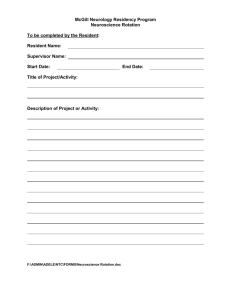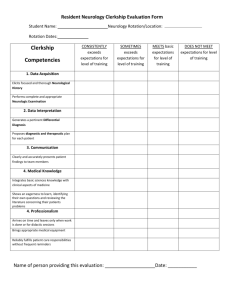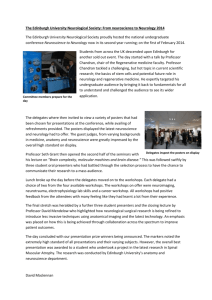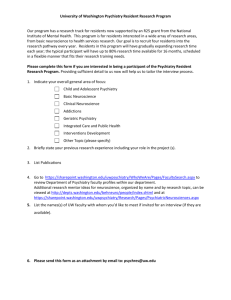Adult Neurology Residency Training Program
advertisement
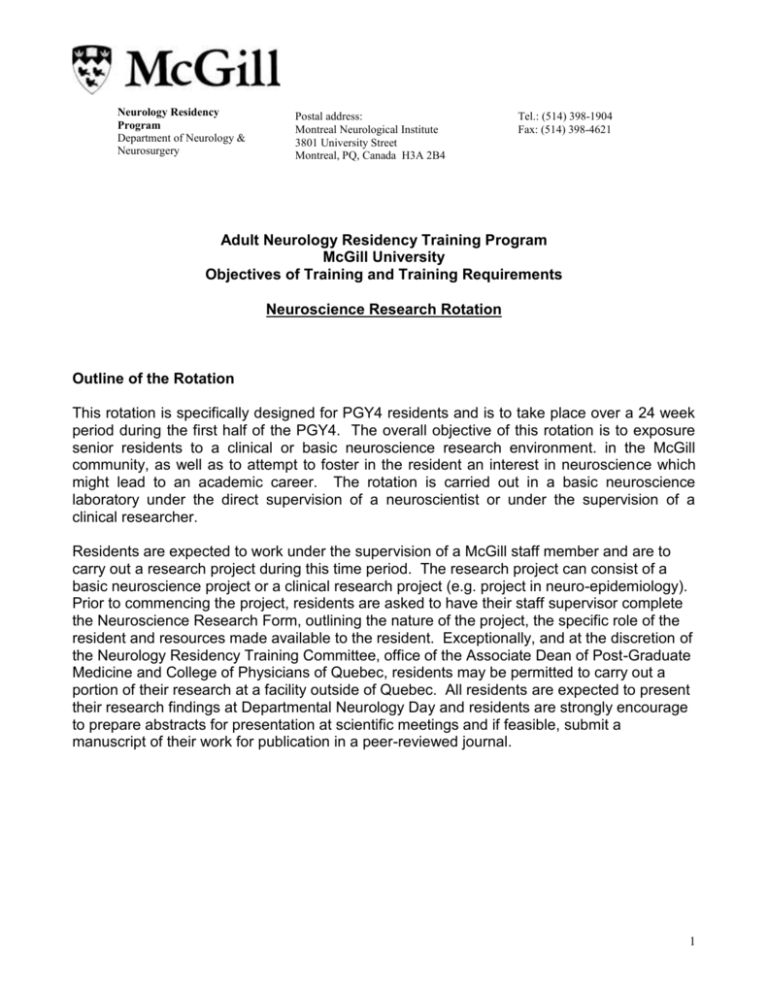
Neurology Residency Program Department of Neurology & Neurosurgery Postal address: Montreal Neurological Institute 3801 University Street Montreal, PQ, Canada H3A 2B4 Tel.: (514) 398-1904 Fax: (514) 398-4621 Adult Neurology Residency Training Program McGill University Objectives of Training and Training Requirements Neuroscience Research Rotation Outline of the Rotation This rotation is specifically designed for PGY4 residents and is to take place over a 24 week period during the first half of the PGY4. The overall objective of this rotation is to exposure senior residents to a clinical or basic neuroscience research environment. in the McGill community, as well as to attempt to foster in the resident an interest in neuroscience which might lead to an academic career. The rotation is carried out in a basic neuroscience laboratory under the direct supervision of a neuroscientist or under the supervision of a clinical researcher. Residents are expected to work under the supervision of a McGill staff member and are to carry out a research project during this time period. The research project can consist of a basic neuroscience project or a clinical research project (e.g. project in neuro-epidemiology). Prior to commencing the project, residents are asked to have their staff supervisor complete the Neuroscience Research Form, outlining the nature of the project, the specific role of the resident and resources made available to the resident. Exceptionally, and at the discretion of the Neurology Residency Training Committee, office of the Associate Dean of Post-Graduate Medicine and College of Physicians of Quebec, residents may be permitted to carry out a portion of their research at a facility outside of Quebec. All residents are expected to present their research findings at Departmental Neurology Day and residents are strongly encourage to prepare abstracts for presentation at scientific meetings and if feasible, submit a manuscript of their work for publication in a peer-reviewed journal. 1 1. Communicator General Requirements Establish working relationships with supervisor and other laboratory personnel. Listen effectively. Discuss appropriate information with laboratory team. 2. Collaborator General Requirements Consult effectively with staff supervisor and other members of the laboratory team. Contribute effectively to team activities. Willingly share knowledge with others 3. Manager General Requirements Utilize resources effectively to balance research needs and outside activities. Allocate finite resources wisely. Work effectively and efficiently in the laboratory setting. Utilize information technology to optimize research work. Specific Requirements Be proficient in professional skills related to the research study. Demonstrate the following professional skills in time management: Recognize that effective use of time depends upon punctuality. Recognize that effective use of time requires planning. Develop speed as well as accuracy in laboratory techniques. Reserve time for reading and keeping current with related literature. 2 Establish routines for carrying out regular activities and adhere to them. Maintain complete and accurate medical records: Record and maintain a complete and accurate record of research related work. 4. Scholar General Requirements Develop, implement and monitor a personal continuing education strategy. Critically appraise sources of medical information. Contribute to development of new knowledge. Specific Requirements Be able to critically assess the neurological literature as it relates to patient diagnosis, investigation and treatment: Develop criteria for evaluating neurological and other related literature. Critically assess the literature using these criteria. Be familiar with the design of experimental and observational studies, especially randomized controlled trials. Be able to calculate absolute risk reductions, relative risk reductions and numbers needed to treat or harm. Be able to participate in clinical or basic science studies as a member of a research team: Be able to describe principles of good research. Use the above principles, and be able to judge whether a research project is properly designed. Complete a six month research elective in either clinical or basic science research during the PGY4. Be prepared to present research findings to peers at local, national or international conferences. 3 5. Professional General Requirements Deliver highest quality care with integrity, honesty and compassion. Exhibit appropriate personal and interpersonal professional behaviours with supervisor and laboratory team. 4
